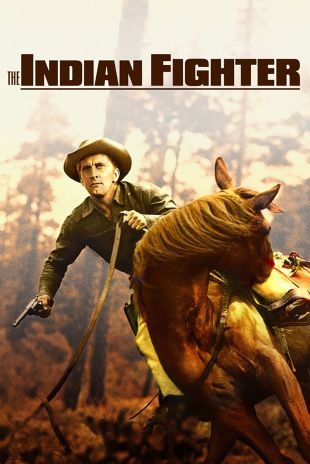
André De Toth's The Indian Fighter (1955) -- starring and produced by Kirk Douglas -- is sort of the left-of-center answer to John Wayne's movie Hondo and to Broken Arrow, starring James Stewart. All three movies, in their depictions of relations between whites and Native Americans, depict good and bad on both sides as well as tragic mistakes in judgment by various participants, but The Indian Fighter is a lot bleaker in its prospects for its hero: John Wayne's Hondo Lane finds a family with which he can go West -- once he's ironed out the difficulty surrounding the fact that he had to kill the woman's husband. And James Stewart's Tom Jeffords is able to pursue peace, but Douglas' Johnny Hawks must abandon the family he nearly "adopted" and all contact with his own people; Hawks has become such an outcast at the end, who must watch from a safe distance as the whites move on in peace. Similarly, there is not a hint that the adult whites around him, with the exception of Walter Abel's army captain, have learned much of anything from the ordeal they suffer from the attack on the wagon train and the fort. One has a profound (and accurate) sense that this is no better than a truce for the moment, with more tragedy to come. Hondo presents a similar point-of-view but seems to offer more hope for its hero who, in any case, has suffered far more at the hands of the Indians by the end of the movie. The Indian Fighter also has an interesting twist on the nature of its villainy: In Hondo and Broken Arrow, the white hostiles are pretty much motivated by a combination of greed and ignorance, but Douglas' production gives us a surprisingly crafty and articulate malefactor in the guise of Wes Todd, played by Walter Matthau, who is smarter than he looks or acts. Additionally, the script is set up in such a way that Hawks has no compunction about turning Todd over to the Native Americans for their brand of justice, at the tip of a burning arrow -- something that few heroes in this kind of movie would have done. It is this act that marks perhaps the surest sign that Hawks must burn his bridges to the white community in order to save himself, and his chosen wife, Onati (played by Elsa Martinelli), as well as the members of that white community who are worth saving. The underlying tone of the movie is, thus, extremely bleak, but is balanced by a story that moves forward at a breakneck pace and takes extraordinarily good advantage of its actual location shooting and widescreen formatting.
